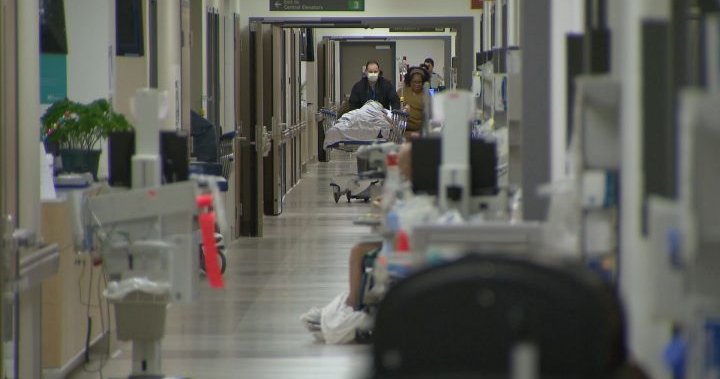COVID-strained health care led to 4K deaths. How do we stop it from happening again? – National | Globalnews.ca
It’s long past time for Canada to make improvements to its health-care systems so patients are better protected in the future, say medical experts.
The flaws in Canada’s health-care system became clearer amid COVID-19, and a recent report showing that thousands of Canadians died from delayed or cancelled procedures serves as another example.
The report, published by the Canadian Medical Association on Tuesday, emphasizes the need for governments to create a “sustainable system” for Canadians — and soon, said Dr. Katharine Smart, president of the CMA.
“This issue — part of it is dollars and more investment. Part of it is better understanding human health resources and investing in them. And part of it is modernizing a system so that it can better serve Canadians and the patients in our country,” she said.
“We need to move forward with action. There’s been a lot of talk, a lot of studying the system, and now is the time to actually get to the table and develop some solutions and implement them.”
Read more:
‘This is big’: Experts concerned that COVID-19 fears could lead to tsunami of cancer cases
The broader impacts of COVID-19
The CMA report, prepared in partnership with Deloitte, detailed the pandemic’s broader impact on society.
Among its findings is an estimate that more than 4,000 people died between August and December 2020 as a result of delayed or cancelled health-care services from hospitals dealing with COVID-19 patients.
Throughout the pandemic’s waves in Canada, provinces have experienced surges in hospital capacity, which have led to non-essential operations shifting to the back-burner. For example, since August, Alberta Health Services said more than 15,000 patients had surgeries cancelled or postponed as the province fought a surge in new COVID infections.

Researchers looked at eight different types of surgeries scheduled across Canada between April 2020 and June 2021 as a means of quantifying the delays affecting patients.
On average, there was a 46-day wait period for breast cancer surgeries in Canada during that time frame. MRI scans came with an average 69-day wait. Hip replacement surgeries involved an average delay of 118 days.
An estimated $1.3 billion in additional funding is needed to restore wait times for those surgeries back to pre-COVID levels by June 2022, the report concluded. But that number could be higher when the impact of the fourth wave of the pandemic is factored in.
Read more:
Ontario Health says healthcare impacts less likely during current COVID wave
Smart said that figure is just a preview of what is needed to get health care back on track.
“This is just a snapshot of the types of procedures and surgeries that have been delayed throughout the pandemic. The actual impact is much broader than that. The $1.3 billion to get us back on track is really just a starting point of what is needed for the system.”
How do we stop this from happening again?
Among the report’s findings was that two-thirds of Canadians living with chronic diseases had difficulty accessing care in 2020. It also noted an increase in opioid-related deaths — up to 20 per day in the first three months of 2021.
For Dr. Naheed Dosani, health equity lead at Kensington Health in Toronto, the report shows health-care systems need to be modernized so “we don’t see these downstream consequences” in the future.
Read more:
Toronto’s top doctor recommends decriminalizing possession of small amounts of illegal drugs
He suggested virtual care, which was brought to the forefront during the pandemic, be leveraged with in-person visits so doctors can meet patients earlier on in a disease trajectory.
Governments also need to enhance funding for outreach teams that engage with people experiencing homelessness and serious illnesses in communities, he added.
“Scaling up harm reduction and safe supply programs is a huge part of that as well,” he said. “There are some policy changes that can be made to better support improvements in our health systems.”
In the throne speech last week, the federal government reinforced its commitment to help improve health care systems and alleviate surgery backlogs.
Read more:
Trudeau throne speech lays out vision for COVID-19 rebuild with ‘economy of the future’
But that overhaul needs to involves an understanding of what isn’t working, Dosani added, pointing to the long-term care sector, which was severely impacted by COVID-19.
“So many workers, particularly nurses and PSWs in long-term care, have precarious jobs. They don’t have adequate paid sick-leave benefits. They don’t have a full-time roles, even if they want them. What that leads to is a decay in the services and a decay in the actual quality of care,” he said.
“We need to elevate the conversation from a minimum standard of care to really funding long-term care and other areas of health care to be more resilient, and the way you do that is you invest in staffing and you invest in people.”

Staffing shortages across the country put professionals like Dr. Laura Hawryluck in difficult situations during the pandemic.
Hawryluck, a critical care doctor in Toronto, told Global News she has seen too many “heartbreaking situations” where people with chronic illnesses didn’t, couldn’t, or were too afraid to access care and died.
“There’s nothing more heartbreaking than being in the ICU and sort of seeing this unfold in front of you and the illness being so far gone that you can’t do anything to turn it around,” she said.
“You can be there for the last moments of somebody’s life and help with their family and loved ones, but that’s not where you want to be.”
Read more:
As COVID-19 strains nurses, Singh says feds must ease barriers for those trained abroad
In her view, while governments need to invest more money, they also need to come up with detailed plans that include how to train and retain health-care workers to replace those who have left the industry.
“We need a plan because with Omicron, and I’m sure other variants of COVID that we’re going to see, we can’t get through the pandemic and then start to worry about where we are with everybody else in this health-care system,” she said.
“People have illnesses where they’ve always needed us to help with them, and that need is only getting bigger.”
View link »
© 2021 Global News, a division of Corus Entertainment Inc.
For all the latest health News Click Here




